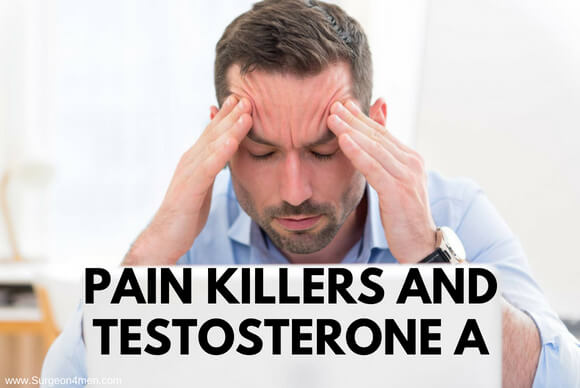Pain Killers and Testosterone
Are you tired or suffering from a minor headache? Take a pain killer.
Body ache? Take a pain killer. Have fever??
And the list of minor ailment goes on, for which a lot of us regularly consume painkillers. Unfortunately, while mindlessly popping pills, none of us think of how these painkillers can affect your body and major metabolic processes.
The pain killers are most commonly used (and to some extent, abused) drugs these days. Common culprits are Tylenol, Paracetamol, Excedrin, etc. People who get sick or deal with pain anywhere in the body usually take these pain killers without giving a second thought and without even consulting the healthcare providers. However, consuming these pain killers frequently is not good for your health. Just like every other drug, pain killer abuse is also associated with some serious side effects. According to a new research, certain classes of pain killers can negatively impact male testosterone levels.
What are the different types of pain killers?
There are numerous types and classes of pain killers that are available in the market. Among these some are available as over the counter formulations, but some potent drugs may require proper medical prescription.
The most commonly used pain killers include:
- NSAID’s (non-steroidal anti-inflammatory drug): The NSAIDs are most frequently used class of painkiller drugs. It suppresses the production of enzymes that heighten the sensation of pain in the body. This includes Paracetamol, Ibuprofen, Aspirin and Naproxen.
- Corticosteroids (Steroid-based drug): These include Hydrocortisone, Dexamethasone, Fludrocortisones. Although there are a number of indications and uses of steroid drugs, the primary indication is to reduce joint pain and inflammation.
- Opioids (opiate based drug): This class include drug agents like Hydrocodone, Oxycodone, Morphine, Codeine etc. Almost all the drugs in this class are very potent and are used to treat extreme pain that does not respond to any other pain killers.
How the use of these pain killer suppress testosterone levels:
NSAID’s:
According to the new research, the use of these drugs occasionally or for short period of time is well-tolerated by the body and does not cause any along term complications or changes in the serum testosterone levels. However, with the long-term use of these drugs, testosterone production reduces significantly over time in the men.
According to another study the consumption of Aspirin in controlled amounts does not exert any noticeable impact on testosterone production however, it reduces the sperm motility.
An experiment was performed by scientists on the laboratory rodents to study the impact of Aspirin consumption on male fertility. As part of the study, rodents were given moderate amounts of aspirin during the study period (around 30 days). Initially the testosterone levels increased but after 15 days of use, the testosterone levels reduced significantly.
Corticosteroids:
They are synthetically created steroids hormone mainly Cortisol, the stress hormone. Cortisol is known for reducing testosterone levels that’s why these are considered harmful for male testosterone levels.
An experiment was conducted on 17 males who were using Corticosteroids for their joint pain. After evaluating the study subjects, it is clear that there is noticeable reduction in the serum testosterone.
Another research was conducted in which 35 subjects who were using corticosteroids were analyzed. After detailed study of the participants it was observed that there is an 18 percent reduction in their testosterone levels.
Opioids:
These drugs are known to suppress gonadotropin production from the brain. A research indicates that the people who use injectable Opioids for their back pain have shown significant decrease in their testosterone levels.
Another survey indicates that 34 percent of the people who are on short term Opioids use have decreased testosterone levels. Same is the case with 74% of the patients using long term Opioids.
Conclusion:
It would be wrong to say that pain killer is of no use; as obviously there must be a genuine reason for the existence of these pain killers. However, consuming these frequently even with minor illness is not good. Overdose of anything can become poisonous. We all know that every medicine comprises of some side effects especially if we use it for a longer period of time or on frequent basis and we should keep this thing in mind before excessively using these drugs.
